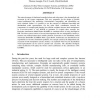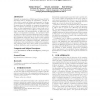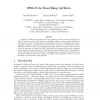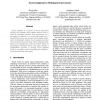484 search results - page 20 / 97 » Social Knowledge in Multi-agent Systems |
DAGSTUHL
1994
13 years 9 months ago
1994
The main advantage of distributed controlled robots and subsystems is the decentralized task execution by the system components. This way, properties for the design of flexible co...
ATAL
2007
Springer
14 years 1 months ago
2007
Springer
Research on organization of Multi-Agent Systems (M.A.S.) has shown that by adapting its organization, a M.A.S. is better able to operate in dynamic environments. In this paper we ...
ATAL
2008
Springer
13 years 9 months ago
2008
Springer
Virtual Organizations (VOs) are becoming an increasingly important research topic in the field of Multi-Agent Systems (MAS). The problem of selecting suitable counterparts to inte...
EUMAS
2006
13 years 9 months ago
2006
Artifacts for Multi-Agent Systems have been defined as runtime entities providing some kind of function or service that agents can fruitfully exploit to achieve their individual o...
ATAL
2004
Springer
14 years 1 months ago
2004
Springer
Social judgment is a process of social explanation whereby one identifies which entities deserve credit or blame for multiagent activities. Such explanations are a key aspect of i...




